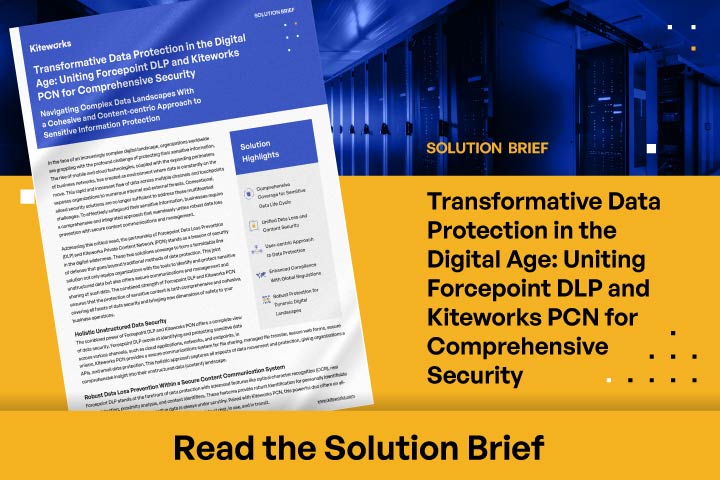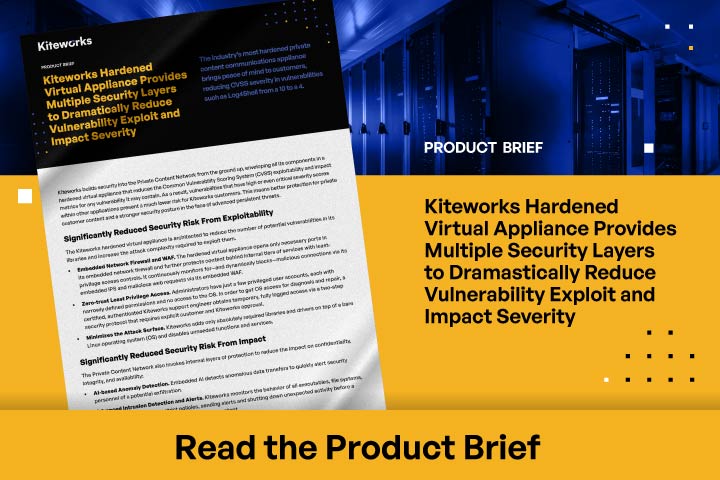Enable Safe Cloud File Sharing
Corporate finance professionals often need to share sensitive financial documents with external third parties. Using common cloud file sharing services can put the company at risk due to potential security vulnerabilities. Kiteworks provides a secure platform for cloud file sharing. Finance professionals can share financial documents securely and in compliance with internal policies and industry regulations. Its robust encryption and access control features ensure that only authorized individuals can access these documents, maintaining privacy and data protection.
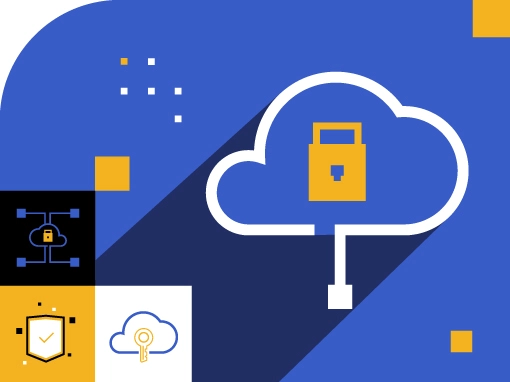

Protect Sensitive Information From Data Leaks
Corporate finance professionals handle non-public information daily. The loss of a device containing sensitive information or malicious activities can place the business at risk due to potential data leaks. Kiteworks provides a secure platform for managing sensitive financial documents. It mitigates the risk of data leaks by controlling access to financial documents, even in the event of a lost or stolen device. Its robust encryption and access control features ensure that only authorized individuals can access these documents, maintaining privacy and data protection.
Provide Traveling Executives With the Latest Numbers
Senior executives often need to make financial decisions while on the road. The quality of these decisions often depends on having access to the most current information, which can be challenging when using mobile devices. Kiteworks provides a secure platform for accessing financial documents from mobile devices. Whether on a tablet or a smartphone, senior executives can have simple and secure access to the most current budgets and sales forecasts. Its robust encryption and access control features ensure that only authorized individuals can access these documents, maintaining privacy and data protection.


Secure Financial Reporting
Finance departments often need to share sensitive financial reports. Ensuring the privacy and security of these reports can be challenging. Kiteworks provides a secure platform for sharing these reports. Its robust encryption and access control features ensure that only authorized individuals can access these reports, maintaining privacy and data protection.
Secure Financial Data Exchange
Finance departments often need to exchange sensitive financial data. Ensuring the privacy and security of this data can be challenging. Kiteworks provides a secure platform for exchanging this data. Its robust encryption and access control features ensure that only authorized individuals can access this data, maintaining privacy and data protection.
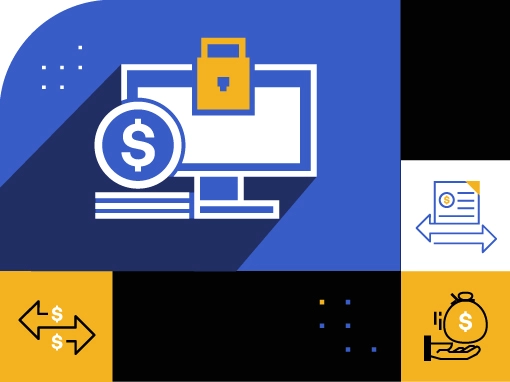

Secure Financial Contract Management
Finance departments often need to manage sensitive contract documents. Ensuring the privacy and security of these documents can be challenging. Kiteworks provides a secure platform for managing these documents. Its robust encryption and access control features ensure that only authorized individuals can access these documents, maintaining privacy and data protection.
Secure Financial Audit Preparation
Finance departments need to prepare for audits by securely managing sensitive documents. This can be a challenge due to the need to maintain confidentiality and protect the data from unauthorized access. Kiteworks allows for secure file sharing, ensuring that these documents are protected and confidential. Its robust encryption and access control features ensure that only authorized individuals can access the audit documents, maintaining data protection and confidentiality.
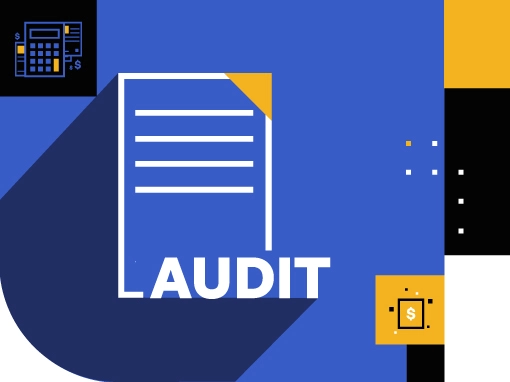
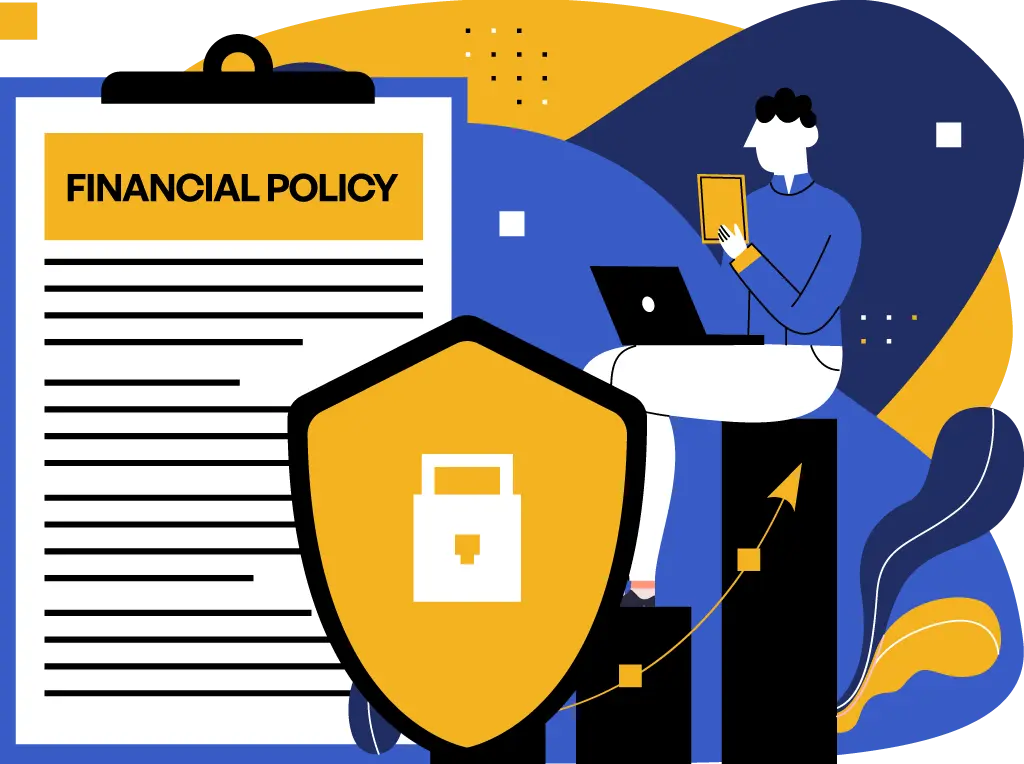
Secure Financial Policy Updates
Finance departments often need to share sensitive policy updates. This can be a challenge due to the need to maintain confidentiality and protect the data from unauthorized access. Kiteworks provides a secure platform for sharing these updates. Its robust encryption and access control features ensure that only authorized individuals can access these updates, maintaining confidentiality and data protection.
Secure Financial Vendor Contracts
Finance departments often need to share sensitive contract documents with vendors. This can be a challenge due to the need to maintain confidentiality and protect the data from unauthorized access. Kiteworks allows for secure file sharing, ensuring that these documents are protected and confidential. Its robust encryption and access control features ensure that only authorized individuals can access the contract documents, maintaining data protection and confidentiality.


Secure Financial Client Communications
Finance departments often need to communicate sensitive information with clients. Ensuring the privacy and security of this communication can be challenging. Kiteworks provides a secure platform for communicating with clients. Its robust encryption and access control features ensure that only authorized individuals can access this communication, maintaining privacy and data protection.
Secure Financial Research
Finance departments often need to conduct sensitive financial research. Ensuring the privacy and security of this research can be challenging. Kiteworks provides a secure platform for conducting and storing financial research. Its robust encryption and access control features ensure that only authorized individuals can access this research, maintaining privacy and data protection.
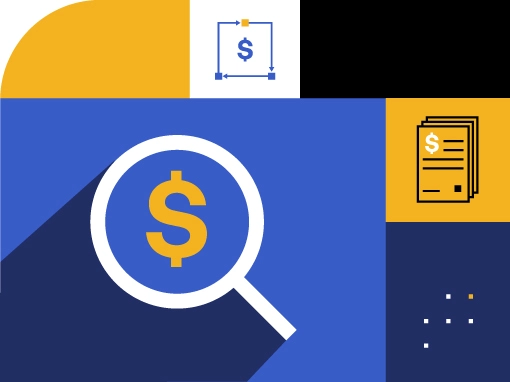

Secure Financial Regulatory Filings
Finance departments often need to file sensitive regulatory documents. Ensuring the privacy and security of these documents can be challenging. Kiteworks provides a secure platform for filing these documents. Its robust encryption and access control features ensure that only authorized individuals can access these documents, maintaining privacy and data protection.
Secure Financial M&A Documentation
During mergers and acquisitions, finance departments often need to share sensitive documents. Ensuring the privacy and security of these documents can be challenging. Kiteworks provides a secure platform for sharing these documents. Its robust encryption and access control features ensure that only authorized individuals can access these documents, maintaining privacy and data protection.
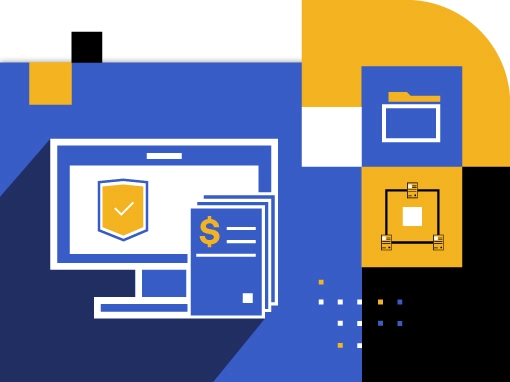
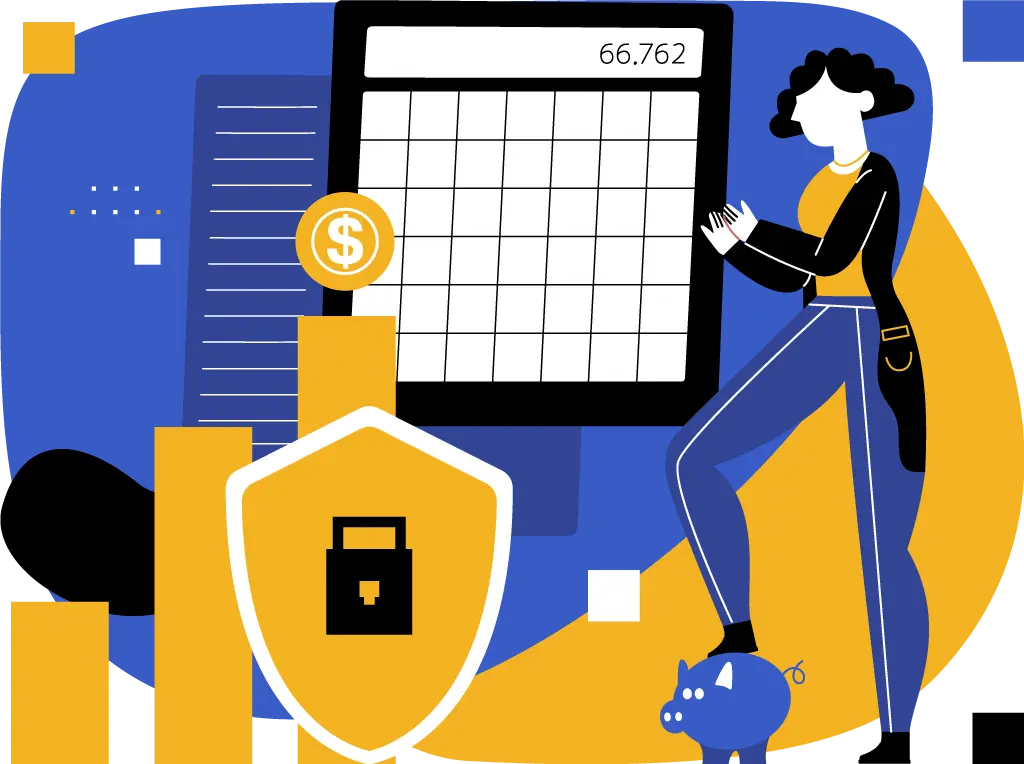
Secure Financial Budget Planning
Finance departments often need to collaborate on sensitive budget planning documents. Ensuring the privacy and security of these documents can be challenging. Kiteworks provides a secure platform for collaborating on these documents. Its robust encryption and access control features ensure that only authorized individuals can access these documents, maintaining privacy and data protection.
Secure Financial Forecasting
Finance departments often need to share sensitive forecasting documents. Ensuring the privacy and security of these documents can be challenging. Kiteworks provides a secure platform for sharing these documents. Its robust encryption and access control features ensure that only authorized individuals can access these documents, maintaining privacy and data protection.
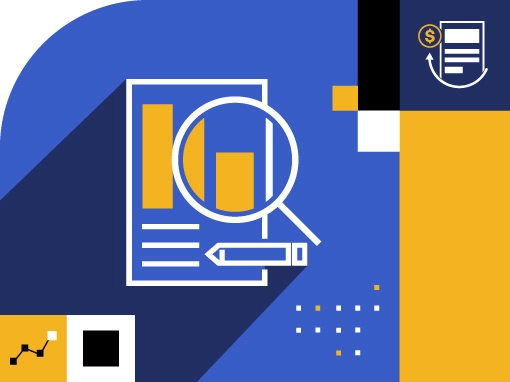

Secure Financial Risk Assessment
Finance departments often need to conduct sensitive risk assessments. Ensuring the privacy and security of these assessments can be challenging. Kiteworks provides a secure platform for conducting and storing risk assessments. Its robust encryption and access control features ensure that only authorized individuals can access these assessments, maintaining privacy and data protection.
Secure Financial Transaction Records
Finance departments often need to manage sensitive transaction records. Ensuring the privacy and security of these records can be challenging. Kiteworks provides a secure platform for managing these records. Its robust encryption and access control features ensure that only authorized individuals can access these records, maintaining privacy and data protection.
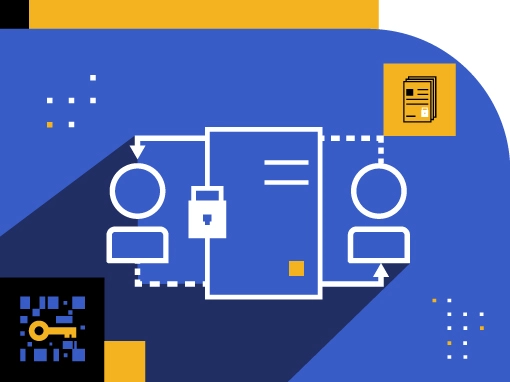
Häufig gestellte Fragen
Abteilungen für Unternehmensfinanzen bearbeiten sensible Informationen, die mit den Finanzen eines Unternehmens zusammenhängen, einschließlich Budgets, Gewinn- und Verlustrechnungen (GuV), Bankunterlagen, Cashflow-Berichte, Verkaufsprognosen, Investitionen, Gehaltsdaten, Bonus- und Vergütungspläne und vieles mehr. Mitarbeiter in Finanzabteilungen von Unternehmen wie Controller, Manager für Finanzplanung und -analyse (FP&A), Gehaltsabrechnungsadministratoren und andere müssen ihre finanziellen Aktivitäten sicher verwalten, da man argumentieren könnte, dass diese Informationen eine Form von geistigem Eigentum (IP) sind und daher als vertraulich gelten.
Abteilungen für Unternehmensfinanzen können verschiedene Cybersecurity-Technologien und Datenschutzprozesse nutzen, um die sensiblen Informationen, die sie verarbeiten, senden und empfangen, zu schützen. Zu diesen Technologien gehören Identity and Access Management (IAM), Multi-Faktor-Authentifizierung (MFA), Data Loss Prevention (DLP), Datenverschlüsselung und vieles mehr. Datenschutzprozesse umfassen Zugriffskontrollen, die es Unternehmen ermöglichen, den Zugang zu vertraulichen Finanzinformationen zu gewähren, zu begrenzen und einzuschränken, interne Audits und regelmäßige Sicherheitsbewusstseinsschulungen.
Mitarbeiter in Finanzabteilungen von Unternehmen können die vertraulichen Finanzinformationen, die sie verarbeiten, speichern und mit externen Dritten teilen, sicher über verschlüsselte Unternehmensdatenmanagementsysteme und Kommunikationsplattformen austauschen. Diese Anwendungen ermöglichen es den Mitarbeitern, Verträge, Tabellenkalkulationen und andere Finanzdaten sicher zu speichern, zu senden und zu empfangen. Abteilungen für Unternehmensfinanzen sollten sicherstellen, dass alle Finanzdaten mindestens passwortgeschützt sind und Verschlüsselung während der Übertragung und im ruhenden Zustand nutzen. Darüber hinaus sollten die Mitarbeiter sicherstellen, dass die Drittparteien, mit denen sie zusammenarbeiten, wie Gehaltsabrechnungsadministratoren, Buchhaltungsfirmen und andere Partner, erstklassige Cybersecurity-Technologien verwenden und Best Practices für Datensicherheit praktizieren. Oftmals verpflichten Unternehmen ihre Partner vertraglich, den Datenschutz im Rahmen eines Lieferantenrisikomanagement-Programms zu wahren.
Datenschutz und Sicherheitsrisiken im Zusammenhang mit Unternehmensfinanzprozessen sind ein großes Anliegen. Es besteht die Möglichkeit, dass Budgets, Verkaufsprognosen, Bankkontoinformationen und andere vertrauliche Finanzdaten abgefangen, manipuliert, als Geisel gehalten oder im Dark Web verkauft werden. All diese potenziellen Ergebnisse können zu finanziellen Verlusten, Rechtsstreitigkeiten und Reputationsschäden führen. Auch die schiere Menge an Finanzdaten, die in Unternehmensfinanzprozessen involviert sind, stellt eine große Herausforderung dar, um den Schutz und die Kontrolle des Zugangs zu diesen Daten zu gewährleisten. Unternehmen müssen daher sicherstellen, dass ihre Finanzdaten sicher gespeichert und nur von Personen mit der entsprechenden Berechtigung abgerufen werden.
Regulatorische Compliance-Vorschriften erfordern, dass Abteilungen für Unternehmensfinanzen nicht nur Buchhaltungsstandards wie GAAP einhalten, sondern auch Transparenz in ihrer Finanzberichterstattung zeigen. Abteilungen für Unternehmensfinanzen müssen auch starke interne Kontrollen aufrechterhalten, um Finanzbetrug zu verhindern. Der Sarbanes-Oxley Act (SOX) schützt beispielsweise individuelle Finanzdaten vor Diebstahl und Manipulation. Der Gramm-Leach-Bliley Act (GLBA) verlangt von Finanzinstituten, ihre Informationspraktiken klar offenzulegen und die Sicherheit von Kundeninformationen zu gewährleisten. Die Datenschutzgrundverordnung (DSGVO) erfordert den verantwortungsvollen Umgang mit personenbezogenen und geschützten Gesundheitsinformationen von EU-Bürgern (PII/PHI), unabhängig davon, wo sie verarbeitet werden. Die Einhaltung dieser und anderer Vorschriften ist für Abteilungen für Unternehmensfinanzen unerlässlich, um das öffentliche Vertrauen und den rechtlichen Schutz zu wahren.
FEATURED RESOURCES

Achieving Zero Trust Security With Kiteworks: A Comprehensive Approach to Data Protection
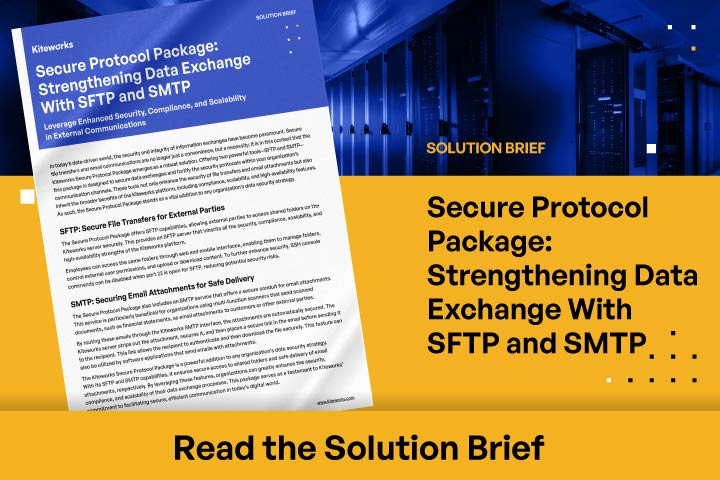
Secure Protocol Package: Strengthening Data Exchange With SFTP and SMTP
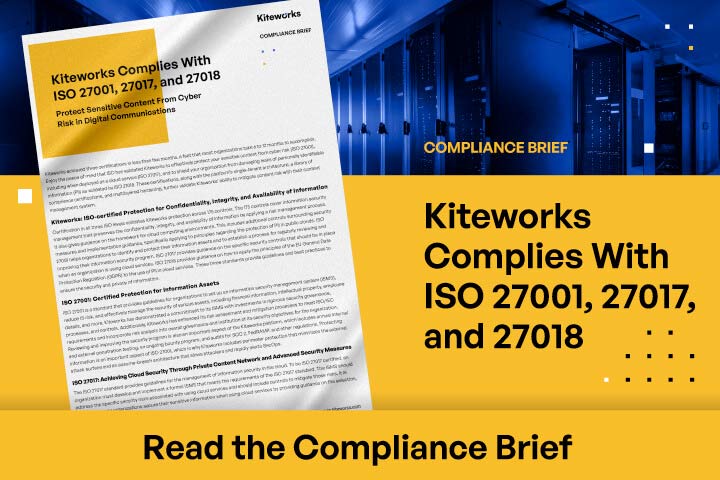
Kiteworks Complies With ISO 27001, 27017, and 27018
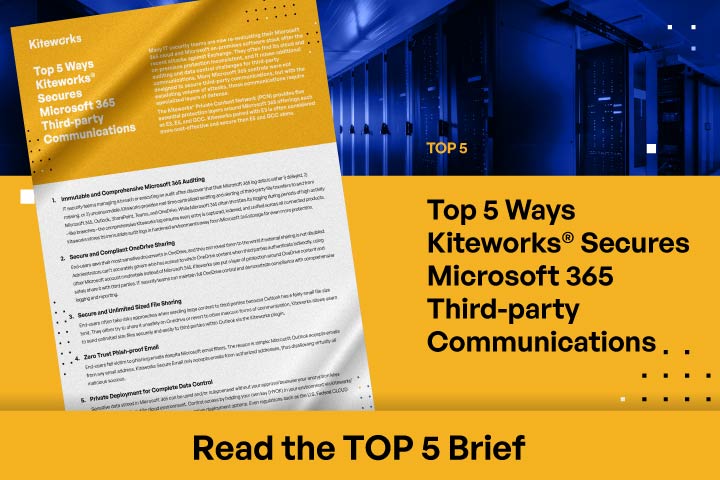
Top 5 Ways Kiteworks Secures Microsoft 365 Third-party Communications
